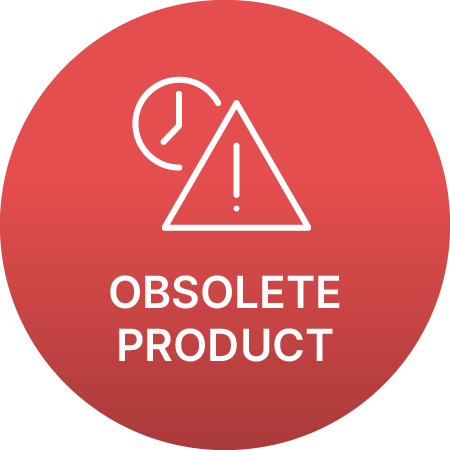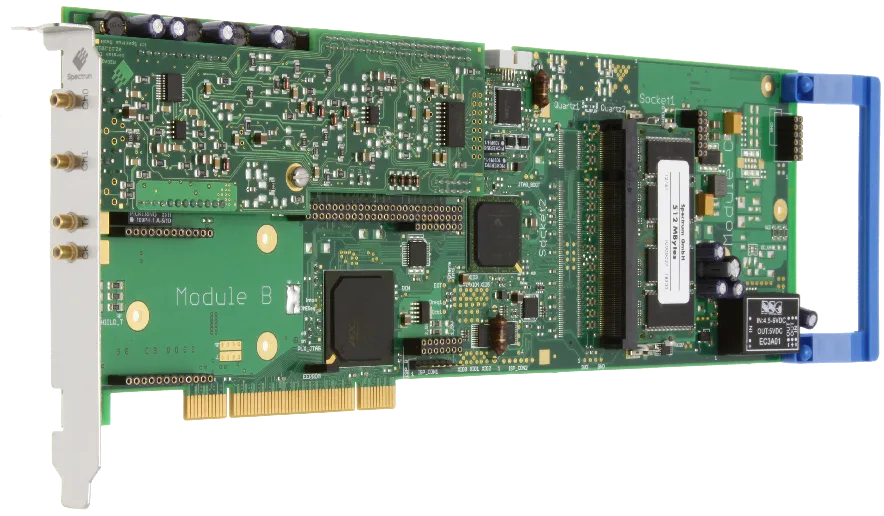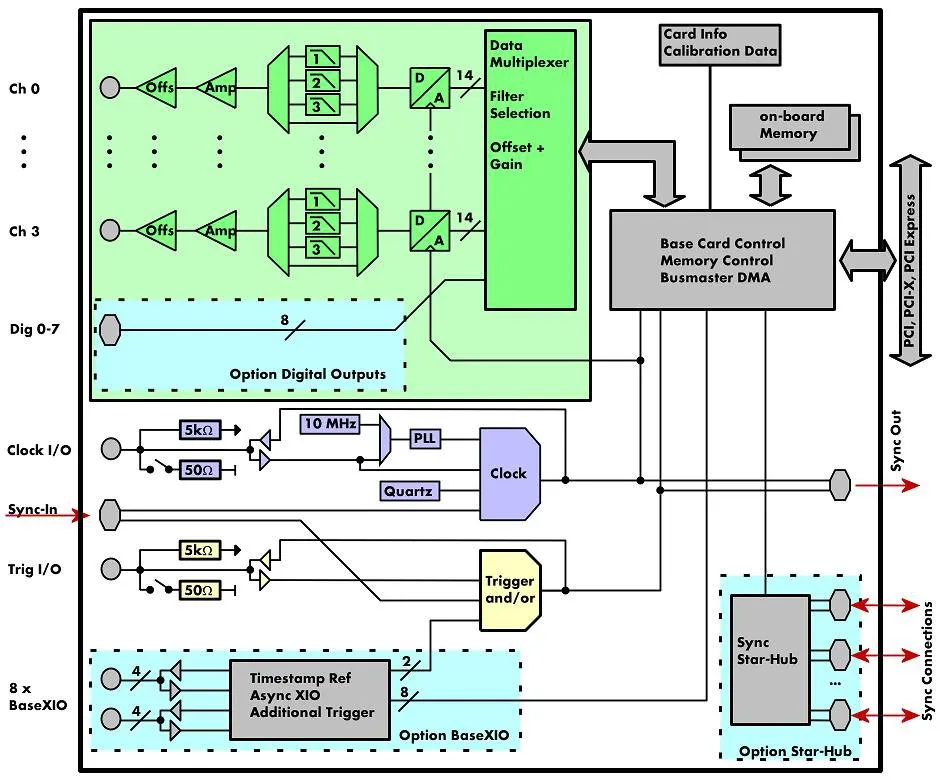THIS PRODUCT IS OBSOLETE. Show more about end-life-products policy.
Recommended product:
Product:
M2i.6011
14 bit Arbitrary Waveform Generator
Description:
The Arbitrary Waveform Generators of the M2i.60xx series are available as 14 bit versions ranging from 20 MS/s up to 125 MS/s output rate. With these boards it is possible to generate free definable waveforms on several channels synchronously. With one of the synchronization options the setup of synchronous multi channel systems is possible. It is also possible to combine the arbitrary waveform generator with other boards of the M2i product family like analog acquisition or digital I/O boards.
Facts & Features:
- Up to 20 MS/s on 2 channels
- Simultaneous generation on all channels
- Output up to +/-3 V in 50 Ohm
- Offset and amplitude programmable
- Amplifier option available for +/-10 V
- Up to 1 GSample on-board memory
- 256 MSample standard memory installed
- 3 software selectable filters
- FIFO mode continuous streaming output
- Synchronization of up to 16 cards
- 66 MHz 32 bit PCI-X interface
- 5V / 3.3V PCI compatible
- 100% compatible to conventional PCI >= V2.1
- Sustained streaming mode up to 245 MB/s
Application examples:
- IQ Base signal generation
- Production tests
- Replay of acquired test data
- Radar signal simulation
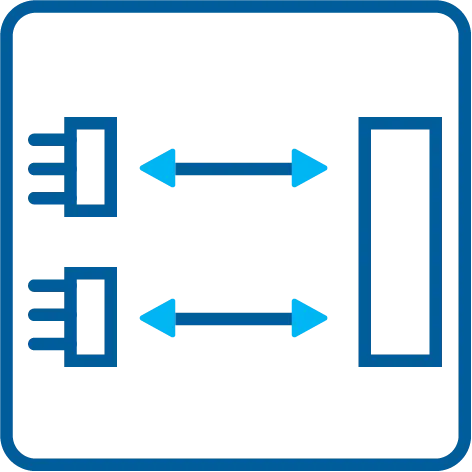
BaseXIO (Optional)
The BaseXIO option offers 8 asynchronous digital I/O lines on the base card. The direction can be selected by software in groups of four. Two of these lines can also be used as additional external trigger sources. This allows the building of complex trigger conjunctions with external gated triggers as well as AND/OR conjunction of multiple external trigger sources like, for example, the picture and row synchronisation of video signals. In addition one of the I/O lines can be used as reference clock for the Timestamp counter.

FIFO mode
The FIFO mode is designed for continuous data transfer between measurement board and PC memory (up to 245 MB/s on a PCI-X slot, up to 125 MB/s on a PCI slot and up to 160 MB/s on a PCIe slot) or hard disk. The control of the data stream is done automatically by the driver on interrupt request. The complete installed on-board memory is used for buffer data, making the continuous streaming extremely reliable.
System Star-Hub (Optional)
Using the System Star-Hub for M2i series cards it is possible to synchronize several systems with each other having the same advantages that the standard Star-Hub gives. The system star-hub allows to extend the number of synchronous channels or set up multiple synchronous data streaming systems either for data storage or online calculations.Repeated Output
When repeated output is used the data of the on-board memory is replayed continuously until a stop command is executed or N times. As trigger source one can use the external TTL trigger or the software trigger.
Sequence Replay Mode
The sequence mode allows to split the card memory into several data segments of different length. These data segments are chained up in a user chosen order using an additional sequence step memory with the ability to program loops and triggers and to reload data while output is running.
Single Restart
When this mode is activated the data of the on-board memory will be replayed once after each trigger event. As Trigger source one can use the external TTL or software trigger.
Singleshot Output
When singleshot output is activated the data of the on-board memory is replayed exactly one time. As trigger source one can use the external TTL trigger or the software trigger.
Star-Hub (Optional)
The star-hub is an additional module allowing the phase stable synchronization of up to 16 boards in one system. Independent of the number of boards there is no phase delay between all channels. The star-hub distributes trigger and clock information between all boards. As a result all connected boards are running with the same clock and the same trigger. All trigger sources can be combined with OR/AND allowing all channels of all cards to be trigger source at the same time. The star-hub is available as 5 card and 16 card version. The 5 card version doesn't need an extra slot.
External Trigger
All boards can be triggered using an external TTL signal. It's possible to use positive or negative edge also in combination with a programmable pulse width. An internally recognized trigger event can - when activated by software - be routed to the trigger connector to start external instruments.

Gated Replay
The Gated Sampling option allows data replay controlled by an external gate signal. Data is only replayed if the gate signal has a programmed level.
Multiple Replay
The Multiple Replay option allows the fast repetition output on several trigger events without restarting the hardware. With this option very fast repetition rates can be achieved. The on-board memory is divided in several segments of same size. Each of them is generated if a trigger event occurs.

External Clock
Using a dedicated connector a sampling clock can be fed in from an external system. It's also possible to output the internally used sampling clock to synchronize external equipment to this clock.

High Precision PLL
The internal sampling clock of the card is generated using a high precision PLL. This powerful device allows to select the sampling rate with a fine step size making it possible to perfectly adopt to different measurement tasks. Most other cards on the market only allow the setup of fixed sampling rates like 100 MS/s, 50 MS/s, 25 MS/s, 10 MS/s, ... without any possibility to set the sampling rate to any value in between.
Reference Clock
The option to use a precise external reference clock (normally 10 MHz) is necessary to synchronize the board for high-quality measurements with external equipment (like a signal source). It's also possible to enhance the quality of the sampling clock in this way. The driver automatically generates the requested sampling clock from the fed in reference clock.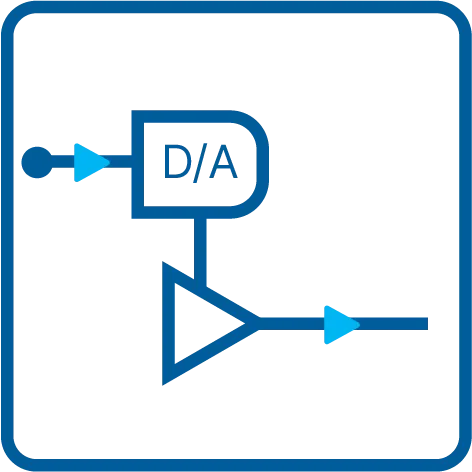
10 V Amplifier Card (Optional)
The amplifier board allows the output of +/-10 V on up to four channels without software modification. The standard outputs of the card are amplified by factor 3.33. The amplifier which has 30 MHz bandwidth has an output impedance of 50 Ohm. This allows +/-10 V with high impedance termination or +/-5 V with 50 ohm termination.
Digital Outputs (Optional)
This option outputs additional synchronous digital channels phase-stable with the analog data. When this option is installed there are 2 additional digital outputs for every analog D/A channel.
Programmable Offset + Amplitude
The Spectrum Arbitrary Waveform Generators are equipped with a very wide programmable output offset and amplitude. This allows to adapt the output signal level to the needs of the stimulated device while also having the maximum output resolution available for the signal.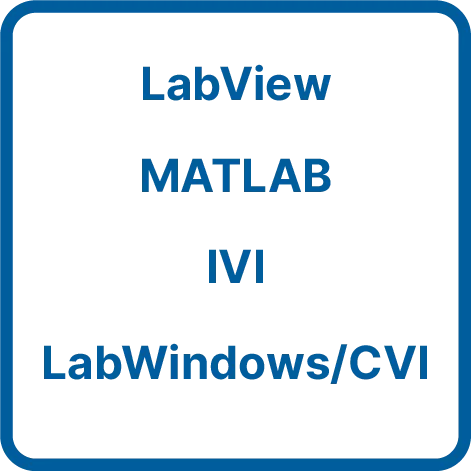
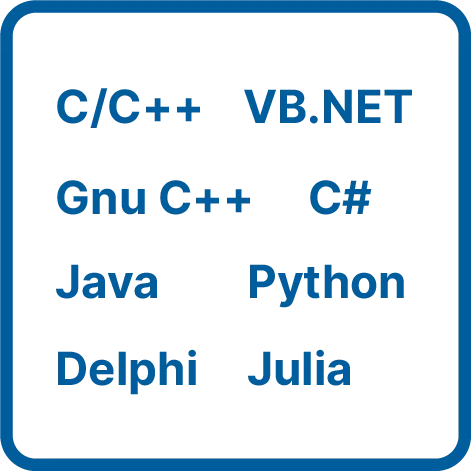
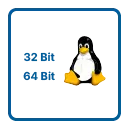


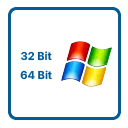
This standard driver is included in the card delivery and it is possible to get the newest driver version free of charge from our homepage at any time. There are no additional SDK fees for the classical text-based programming. All boards are delivered with drivers for Windows 7, Windows 8, Windows 10 and Windows 11, all 32 bit and 64 bit.
| Product | Channels | Max. Samplerate | Max. Bandwidth |
|---|---|---|---|
| M2i.6012 | 4 | 20 MS/s | 10 MHz |
| M2i.6021 | 2 | 60 MS/s | 30 MHz |
| M2i.6022 | 4 | 60 MS/s | 30 MHz |
| M2i.6030 | 1 | 125 MS/s | 60 MHz |
| M2i.6031 | 2 | 125 MS/s | 60 MHz |
| M2i.6033 | 2 | 125 MS/s | 60 MHz |
| M2i.6034 | 4 | 125 MS/s | 60 MHz |
| On different platforms | Bus | Max. Bus Transfer speed |
|---|---|---|
| M2i.6011-Exp | PCI Express x1 | 160 MByte/s |
| MC.6011 | CompactPCI | 100 MByte/s |
| MI.6011 | PCI | 100 MByte/s |
| MX.6011 | PXI | 100 MByte/s |

D/A Amplifier Card (Optional)
The D/A amplifier card is especially designed to match the Spectrum arbitrary waveform generator products and has a bandwidth of 30 MHz. Each of the 1, 2 or 4 channels has a fixed amplification and can drive +/-10 V output level into high impedance and +/-5 V output level into 50 ohm. The output amplfiers are completely calibrated together with the AWG card.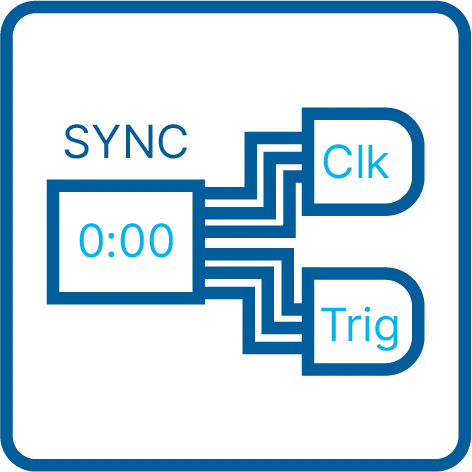
Clock / Trigger Distribution (Optional)
The Clock and Trigger Distribution card allows to externally connect several systems with a common clock and a synchronized trigger signal. One can connect up to 17 independent systems or external equipment using this card.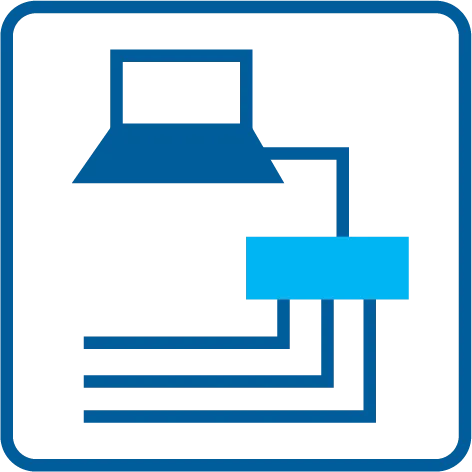
Docking Stations (Optional)
All Spectrum products can be used in 3rd party docking stations, connected by either PCIe interface card or by Thunderbolt interface. Docking stations can extend a standard PC by up to 16 PCIe slots.Documents
Windows driver installation of driver versions < 4.0 |
21.02.2022 | 1 M | ||
Datasheet of the M2i.60xx family |
21.02.2022 | 718 K | ||
Manual of M2i.60xx family |
21.02.2022 | 7 M | ||
Product Discontinuance Notification for M2i.60xx/61xx Series |
21.02.2022 | 250 K | ||
Datasheet of Spectrum Terastore Streaming System |
21.02.2022 | 910 K | ||
AWG Amplifier PCIe/PCI/PXI Card data sheet |
21.02.2022 | 175 K | ||
M2i Clock / Trigger distribution card |
21.02.2022 | 217 K | ||
M2i StarHub module datasheet |
21.02.2022 | 224 K | ||
Data sheet of Docking Station |
21.02.2022 | 166 K | ||
Short Manual for IVI Driver |
21.02.2022 | 532 K | ||
Data sheet of SBench 6 |
15.01.2024 | 999 K | ||
Manual for MATLAB driver M2p/M4i/M4x/M5i/M2i/M3i/DN2/DN6 |
13.12.2023 | 1 M | ||
Manual for LabVIEW drivers for M2i/DN2 |
21.02.2022 | 2 M | ||
Manual for SBench 6 |
21.02.2022 | 7 M |
WINDOWS DRIVER + SOFTWARE
M2i / M3i driver - last Version for Windows 2000 |
2 | 21.02.2022 | 437 K | |
M2p/M4i/M4x/M5i/M2i/M3i/DN2/DN6 driver for Windows 7, 8, 10, 11 (32/64 bit) |
7.00 | 23.02.2024 | 5 M | |
M2i/M3i/M4i/M4x driver - last Version for Windows 32 XP / Vista |
3.30 | 21.02.2022 | 2 M | |
M2i/M3i/M4i/M4x driver - last Version for Windows 64 XP / Vista |
3.20 | 21.02.2022 | 3 M | |
C/C++ driver header and library files |
7.00 | 23.02.2024 | 43 K | |
Spectrum Control Center - last Version for Windows 2000 |
1.41 | 21.02.2022 | 8 M | |
IVI Driver for IVI FGen class (32 bit) |
23.02.2024 | 3 M | ||
SBench 5 Installer |
5.3.0 | 21.02.2022 | 5 M | |
SPEasyGenerator installer |
23.02.2024 | 6 M | ||
Spectrum Control Center (32-bit) / Windows 7, 8, 10 |
2.35 | 23.02.2024 | 22 M | |
Spectrum Control Center (64-bit) / Windows 7, 8, 10, 11 |
2.35 | 23.02.2024 | 25 M | |
Spectrum Control Center - last Version for Windows XP |
1.74 | 21.02.2022 | 8 M | |
SBench 6 (32-bit) Installer / Windows 7, 8, 10 |
6.5.07 | 23.02.2024 | 36 M | |
SBench 6 (64-bit) Installer / Windows 7, 8, 10, 11 |
6.5.07 | 23.02.2024 | 39 M | |
SBench6 - last Version for Windows XP |
6.3.5 | 21.02.2022 | 41 M | |
Windows Installer for Remote Server Option |
23.02.2024 | 13 M | ||
M2i/M2p/M3i/M4i/M4x/M5i/DN2/DN6 LabView driver installer |
23.02.2024 | 19 M | ||
M2p/M4i/M4x/M5i/M2i/M3i/DN2/DN6 Matlab driver + examples installer |
23.02.2024 | 7 M | ||
Windows Examples (C/C++, .NET, Delphi, Java, Python, Julia ...) |
7.00 | 23.02.2024 | 2 M |
LINUX DRIVER + SOFTWARE
M2p/M4i/M4x/M5i/M2i/M3i drivers (Kernel + Library) for Linux 32 bit and 64 bit |
7.00 | 23.02.2024 | 12 M | |
Driver libraries (no Kernel) for Linux 32 bit and 64 bit |
7.00 | 23.02.2024 | 9 M | |
Spectrum Remote Server Linux Installer Package |
23.02.2024 | 12 K | ||
Spectrum Control Center |
2.35 | 07.03.2024 | 57 M | |
SBench 6 Linux 32 (.rpm) |
6.5.07 | 23.02.2024 | 26 M | |
SBench 6 Linux 64 (.rpm) |
6.5.07 | 23.02.2024 | 26 M | |
SBench 6 Linux 32 (.deb) |
6.5.07 | 23.02.2024 | 23 M | |
SBench 6 Linux 64 (.deb) |
6.5.07 | 23.02.2024 | 22 M | |
SBench6 Jetson (.deb) |
6.5.07 | 23.02.2024 | 8 M | |
Drivers + examples for MATLAB for Linux (DEB + RPM) |
23.02.2024 | 183 K | ||
Linux Examples (C/C++, Python, Julia ...) |
7.00 | 23.02.2024 | 556 K |
Firmware
M2i/M2p/M3i/M4i/M4x/M5i firmware update (Windows) |
23.02.2024 | 22 M | ||
M2i/M2p/M3i/M4i/M4x/M5i firmware update (Linux) |
23.02.2024 | 30 M |
Case Studies
| CS Automotive Data Recorder | Case Automotive Data Study Recorder and Playback Solution |
21.02.2022 | 278 K | |
| CS Time Reversal Focusing | Case Study: High Amplitude Time Reversal Focusing of Acoustic Waves |
21.02.2022 | 6 M | |
| CS Atmospheric Lidar | Case Study: Digitizers and AWG used for Atmospheric Research |
21.02.2022 | 939 K | |
| CS Road Radar | Case Study: Digitizers used for intelligent road-radar to detect wild animals |
21.02.2022 | 3 M | |
| CS AWG moving Atoms | Case Study: AWG-card by Spectrum used to move around single atoms |
21.02.2022 | 2 M | |
| CS Lighning Research with Digitizer | Case Study: ADC cards by Spectrum Instrumentation help to reveal the secrets of how lightning forms |
28.03.2024 | 418 K |
Product Notes
| Trigger and Sync | Trigger, Clock and Synchronization Details at high-speed Digitizers |
21.02.2022 | 1 M | |
| Digitizer Software Integration | Software Support for Modular Digitizers |
21.02.2022 | 724 K | |
| SBench 6 Introduction | SBench 6 - Data Acquisition and Analysis of Digitizer Data |
21.02.2022 | 1 M | |
| AWG Waveforms | Creating AWG Waveforms in SBench 6 using Equations |
21.02.2022 | 479 K | |
| Create & Capture AWG Waveforms | Creating , Capturing and Transferring Waveforms for AWG's using SBench 6 |
21.02.2022 | 2 M |
Application Notes
| Teaming AWG with Digitizer | Teaming an Arbitrary Waveform Generator with a Modular Digitizer |
21.02.2022 | 919 K | |
| Introduction to Modular Arbitrary Function Generators | An Introduction to Modular Arbitrary Function Generators |
21.02.2022 | 701 K | |
| Arbitrary Waveform Generator Operating Modes | Using Arbitrary Waveform Generator Operating Modes Effectively |
21.02.2022 | 481 K | |
| AN008 Install Legacy Win Drivers | Application Note: Legacy Windows Driver Installation |
21.02.2022 | 1 M |
